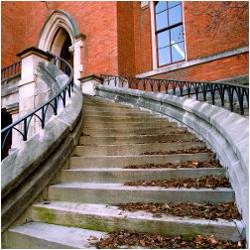
Between 20002001 and 20102011, prices for undergraduate tuition, room, and board at public institutions rose 42%, and prices at private not-for-profit institutions rose 31%, after adjustment for inflation."a With rising costs, large numbers of graduates are leaving college with huge debts and are struggling to find work. Fifty-three percent of recent college graduates are jobless or underemployed, the highest in 11 years.b The core value proposition of higher education is under increasing scrutiny, in part because of the disconnect between student’s expectations, the traditional classroom experience, and the ever-growing need for active creators in the marketplace.
There is a basic divide between most students’ expectations for college—a means to employment first and a good intellectual experience second; and what universities believe their value is—an intellectual and social experience first, with only secondary consideration to employment. At the same time, existing credentials carry very little information for employers to really decide who has the skills and talents they need.
So let us face this as an open-ended design problem: Is it possible to craft a university experience that bridges the gap between students’ expectations, universities’ strengths, and employers’ needs? One that provides the rich social and intellectual atmosphere of a good existing college, while at the same time exposing students to those intellectual but also practical fields that will make them valuable to the world. Where "microcredentials" could be earned and maintained in intellectual and vocational fields to prove to the world what a student can do. And now let’s be ambitious: Might there be a sustainable way to make this experience free or even pay the students to participate?
Computer science is a good place to start. I know the field reasonably well and I also have a sense for the job market—which is tight and growing tighter every day. It is a field where degrees can be valuable, but the ability to design and execute on open-ended, complex projects is paramount; 17-year-olds with unusual creativity and intellect have been know to get six-figure salaries. Because of the demand for talent and the recognition that college degrees and high GPAs are not the best predictor of creativity, intellect, or passion, top employers have begun to treat summer internships as something of a farm league. They observe students actually working and make offers to those who perform the best. Employers know that working with a student is an infinitely better assessment than any degree or transcript.
Students have also begun to recognize something very counterintuitive: that they are more likely to get an intellectual grasp of computer science—which is really the logical and algorithmic side of mathematics—by working at companies like Google, Microsoft, or Facebook or trying to create their own mobile applications than by reading textbooks or sitting in lecture halls. They see the real-world projects as being more intellectually challenging and open-ended than the somewhat artificial projects given in classrooms. Even more, they know that the product of their efforts has the potential to touch millions of people instead of just being graded by a teaching assistant and thrown away.
So, to be clear, in software engineering, the internship and self-directed projects have become far more valuable to the students, as an intellectual learning experience, than any university class. And they have become more valuable to employers, as a signal of student ability, than any formal credential, class taken, or grade point average.
When it comes to internships, I want to emphasize that these are very different from the ones many people remember having even 20 years ago. There is no getting coffee for the boss, sorting papers or doing other types of busywork. The projects are not just cute things to work on that have no impact on real people. In fact, the best way to differentiate between forward-looking, 21st century industries and old-school, backward-looking ones is to see what interns are doing. At top Internet companies, interns might be creating patentable artificial intelligence algorithms or even creating new lines of business. By contrast, at a law firm, government office, or publishing house, they will be doing paperwork, scheduling meetings, and proofreading text. This trivial work will be paid accordingly, if at all, whereas pay scales at the new-style internships reflect the seriousness of the work involved.
Given the increasing importance of real-world projects in terms of both intellectual enrichment and enhancement of job prospects, why do traditional colleges tend to limit them to summers, pushing them aside to cater to the calendar needs of lectures and homework? The answer is simple inertia—this is how it has always been done, so people have not really questioned it.
Actually, some universities have. Despite being founded not even 60 years ago, the University of Waterloo is generally considered to be Canada’s top engineering school. Walk down a hallway at Microsoft or Google and you will find as many Waterloo grads as those from MIT, Stanford, or Berkeley—despite the fact that, because of work visa issues, it is a significant hassle for U.S. employers to hire Canadian nationals. And this is not some attempt to get low-cost labor from across the border—Waterloo graduates are commanding salaries as high as the very best American grads. What is Waterloo doing right?
Employers know that working with a student is an infinitely better assessment than any degree or transcript.
For one thing, Waterloo recognized the value of internships long ago (they call them co-ops) and has made them an integral part of its students’ experience. By graduation, a typical Waterloo grad will have spent six internships lasting a combined 24 months at major companies—often American. The typical U.S. college graduate will have spent about 36 months in lecture halls and a mere three to six months in internships.
This past winter—not summer—all of the interns at the Khan Academy, and probably most of the interns in Silicon Valley, were from Waterloo because it is the only school that views internships as an integral part of students’ development outside of the summer. While the students at most colleges are taking notes in lecture halls and cramming for winter exams, the Waterloo students are pushing themselves intellectually by working on real projects with experienced professionals. They are also getting valuable time with employers and pretty much guaranteeing several job offers once they graduate. On top of that, some are earning enough money during their multiple high-paying internships to pay for their tuition (which is about 1/6th to 1/3rd the cost of a comparable American school) and then some. So Waterloo students graduate with valuable skills, broad intellectual development, high-paying jobs, and potential savings after four or five years.
What is completely different is where and how the students spend their days.
Compare this to the typical American college grad with tens or hundreds of thousands of dollars in debt, no guarantee of an intellectually challenging job, and not much actual experience with which to get a job.
Waterloo has already proven that the division between the intellectual and the useful is artificial; I challenge anyone to argue that Waterloo co-op students are in any way less intellectual or broad thinking than the political science or history majors from other elite universities. If anything, based on my experience with Waterloo students, they tend to have a more expansive worldview and are more mature than typical new college graduates—arguably due to their broad and deep experience base.
So let us imagine optimizing the model that schools like Waterloo have already begun. Imagine a new university in Silicon Valley—it does not have to be there but it will help to make things concrete. I am a big believer that inspiring physical spaces and rich community really does elevate and develop one’s thinking. So we will put in dormitories, nicely manicured outdoor spaces, and as many areas that facilitate interaction and collaboration as possible. Students would be encouraged to start clubs and organize intellectual events. So far, this is not so different from the typical residential college.
What is completely different is where and how the students spend their days. Rather than taking notes in lectures halls, these students will be actively learning through real-world, intellectual projects. A student could spend five months at Google optimizing a search algorithm. She might spend another six months at Microsoft working on human speech recognition. The next four months could be spent apprenticing under a designer at Apple, followed by a year of building her own mobile applications. Six months could be spent doing biomedical research at a startup or even at another university like Stanford. Another four months could be spent prototyping and patenting an invention. Students could also apprentice with venture capitalists and successful entrepreneurs, eventually leading to attempts to start their own businesses. One of the primary roles of the college itself would be ensure the internships are challenging and intellectual; that they truly do support a student’s development. The college will also provide a scaffold of shared, physical experiences, but they will not be passive lectures. They will be active interactions between faculty and students.
All of this will be tied together with a self-paced academic scaffold through something like EdX (Harvard, MIT, and Berkeley’s "MOOC") or Khan Academy. Students will also still be expected to have a broad background in the arts and deep proficiency in the sciences; it will just be done in a more natural way. They will be motivated to formally learn about linear algebra when working on a computer graphics apprenticeship at Pixar or Electronic Arts. They will want to learn accounting when working under the CFO of a publicly traded company. Ungraded seminars will be held regularly during nights and weekends when students can enjoy and discuss great works of literature and art. If the students decide they want to prove their academic ability within a domain—like algorithms or French history—they can sign up for rigorous assessments leading to microcredentials that are valued by employers and graduate schools.
This thought experiment envisions a school focused on engineering, design, and entrepreneurship in Silicon Valley. We placed it there so that it could take advantage of the local ecosystem, but why not a school of finance or journalism located in New York or London, or a school focused on energy in Houston? Even better, why can’t they all be affiliated so that a student can experience multiple cities and industries, all while having a residential and intellectual support network?
Will this be for everyone? Absolutely not. But majoring in literature or accounting at a traditional university is not for everyone either. There should be more options, and this could be one of them—an option that introduces diversity of thought and practice into a higher education world that has not changed dramatically in hundreds of years.
It also should be noted that this does not necessarily have to be a new university. Existing campuses could move in this direction by de-emphasizing or eliminating lecture-based courses, having their students more engaged in research and co-ops in the broader world; and have more faculty with broad backgrounds that show a deep desire to mentor students.




Join the Discussion (0)
Become a Member or Sign In to Post a Comment